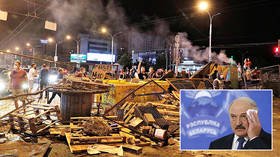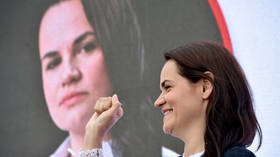Lukashenko: Short-term victory, long-term defeat

After two nights of protests following the presidential election in Belarus, it’s clear that the formal winner, incumbent President Alexander Lukashenko, might have won tactically – but he definitely lost strategically.
The death of at least one protester, the cruelty of police and the extreme violence of the confrontation (the two sides drove vehicles into crowds several times) indicated the extreme polarization of society in Belarus, a post-Soviet republic of 10 million people.
Why can we still say that Alexander Lukashenko won a tactical battle? He will stay in power, at least for the time being, because his opposition is fragmented and does not have a single leader. The formal “second runner” in the election, housewife Svetlana Tikhanovskaya (who got almost 10 percent of the vote, the best official result for an opposition candidate during Lukashenko’s 26 years in power), does not have the skill nor the will to press ahead with a recount of the votes, even though very few people believe Lukashenko’s official score of over 80 percent of the vote.
But why can we also safely say that Lukashenko lost in the long run? The image of “peaceful Belarus,” a “Switzerland of East Slavs,” which Lukashenko has been working on for more than two decades, is gone. Using CCTV footage, tough police and a repressive justice system, he may go after a few hundred of the people who resisted police violently (some even used Molotov cocktails). But rather sooner than later, Lukashenko will have to leave office, and this will definitely not be the departure of a “successful autocrat,” not after the two tragic nights of protest.
Let’s face it: the protests, which gathered tens of thousands of people for angry demonstrations in the center of the capital Minsk and several other important cities, will most likely peter out. In the former Soviet Union, for a success of a “colored revolution” you need both discontent among the population and active complementary pressure from foreign powers. The combination of the two was the formula of success for the Maidan “protest coup” in neighboring Ukraine in 2014. Western pressure, which forced Ukrainian oligarchs to betray the legally elected Ukrainian President Viktor Yanukovich in 2014 using threats of account freezes and other sanctions, is almost non-existent in the case of Belarus in 2020.
The US and the EU have not even been preparing for a possible active role after the election of August 9, 2020. And the reason was Lukashenko’s anti-Russian moves of the last at least three years, which cost him the support of part of his electorate (people supporting closer integration with Russia), but obviously won him some measure of neutrality from the West.
Also on rt.com Belarus on the brink? Unloved in Moscow, a pariah again in the West & facing protests at home, Lukashenko is running out of roadThe West’s attitude could best be summarized by a quote from Bloomberg’s analytical piece on Belarus which came out days before the election. The Western leaders, it says, “know that Lukashenko, unsavory as he may be, is the best guarantor of Belarusian independence from Russia, and thus Belarus as a buffer zone. For the sake of the EU’s own geopolitical interests, they should support him, at least tacitly.”
Lukashenko counted on this cynical attitude from the West, and one can’t say that he was far off the mark. London’s Telegraph writes that “the West is reluctant to implement sanctions, because it has already invested somewhat in warming relations with Belarusian authorities.
“Punishing Lukashenko could mean burying the (admittedly modest) achievements of a Belarus-West dialogue that started in 2014, after the conflict in Ukraine,” it added.
In order to pamper himself from the West’s side, Lukashenko opted on July 29 for an anti-Russian provocation, arresting in a hotel a group of 33 unarmed, well-behaved Russian men, who might have been on their way to a delicate mission in some other country, but certainly did not want “to destabilize Belarus” or remove Lukashenko from power, as he kept claiming for several days after the Russians’ arrest.
The funny thing is that the Western media and even some politicians bought Lukashenko’s provocation, taking it hook, line and sinker in hair-raising stories about “Putin’s little green men” arriving to Belarus. “The Russian warriors of death had a secret plan” – this headline from Spain’s El Mundo best summarizes the Western media’s myopic and sensationalist attitude to the problems of Belarus.
When Lukashenko met in 2018-2019 with representatives of the Washington-based Atlantic Council, an organization which supported the Maidan “revolution” in Ukraine, he understood the ideological limitations of the West. These people simply MUST believe in “Putin’s little green men” and in Russia’s intention to violently absorb the former republics of the late Soviet Union and Russian Empire. That attitude reflects the rigid anti-Russian ideological cliches of both the modern US and the modern EU. Lukashenko decided to play on that, imitating his “fear of a Russian attack,” and he did not miscalculate. The headline of the Atlantic Council’s analytical piece from the beginning of 2020 – “Is Belarus Putin’s Next Target” – best illustrates the absurd direction of the Western elite’s thinking on Belarus.
But Lukashenko miscalculated in his expectations from his own people, who refused to buy his stories about a possible Russian invasion and the need for another presidential term for him. So, now we are seeing the collapse of Lukashenko’s efforts to build a new “privileged relationship” with the West, despite the fact that the US and Belarus brought their diplomatic relations back to ambassador level on the eve of Mr Lukashenko’s not very glorious return to power. (One more embarrassment for US foreign policy, as we see now.)
But most importantly, Lukashenko insulted and antagonized the real ally of Belarus – Russia. August will end, and Belarus will once again need Russian oil and natural gas. It will need economic ties to Russian partner-enterprises, whose orders and payments keep the machine-building industry of Belarus and its robust food production afloat. Will Russia forgive Lukashenko all his hostile actions, as well as the current violence in Minsk, which is seen as a personal misfortune by millions of Russians? Never try to sit on two chairs at once – such could be this summer’s lesson for Lukashenko.
Think your friends would be interested? Share this story!
The statements, views and opinions expressed in this column are solely those of the author and do not necessarily represent those of RT.















